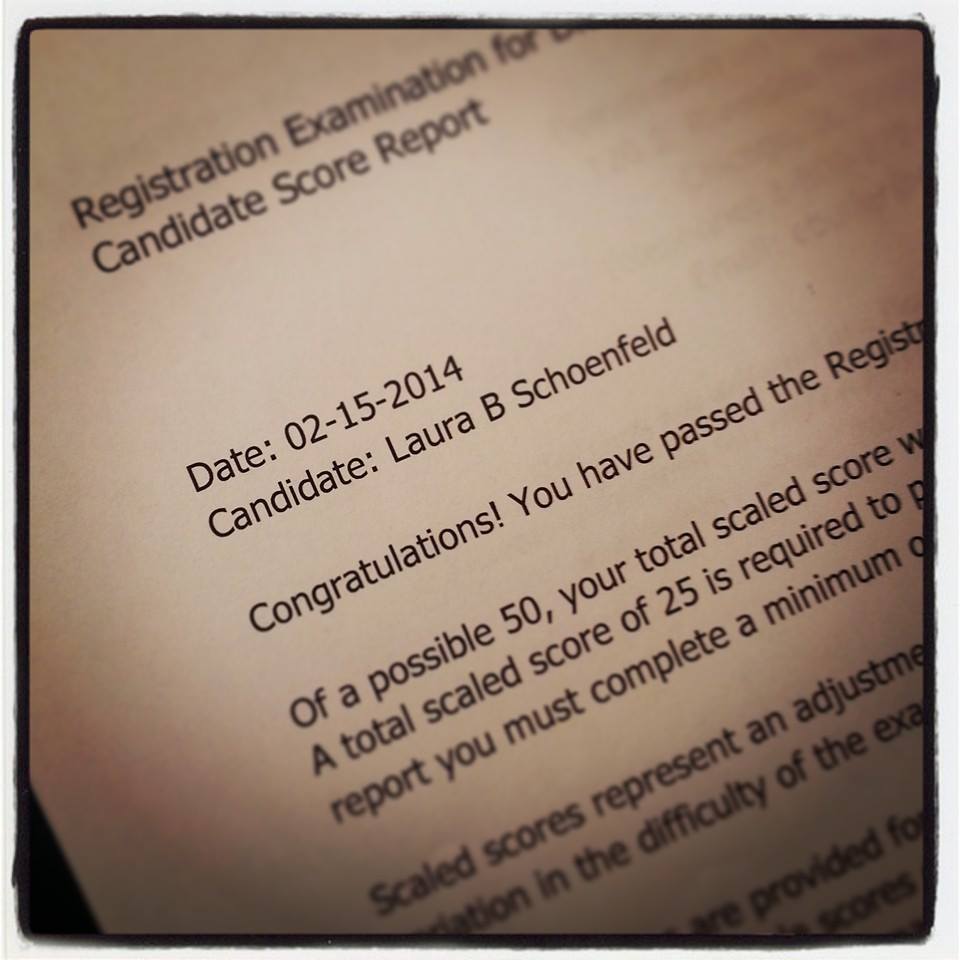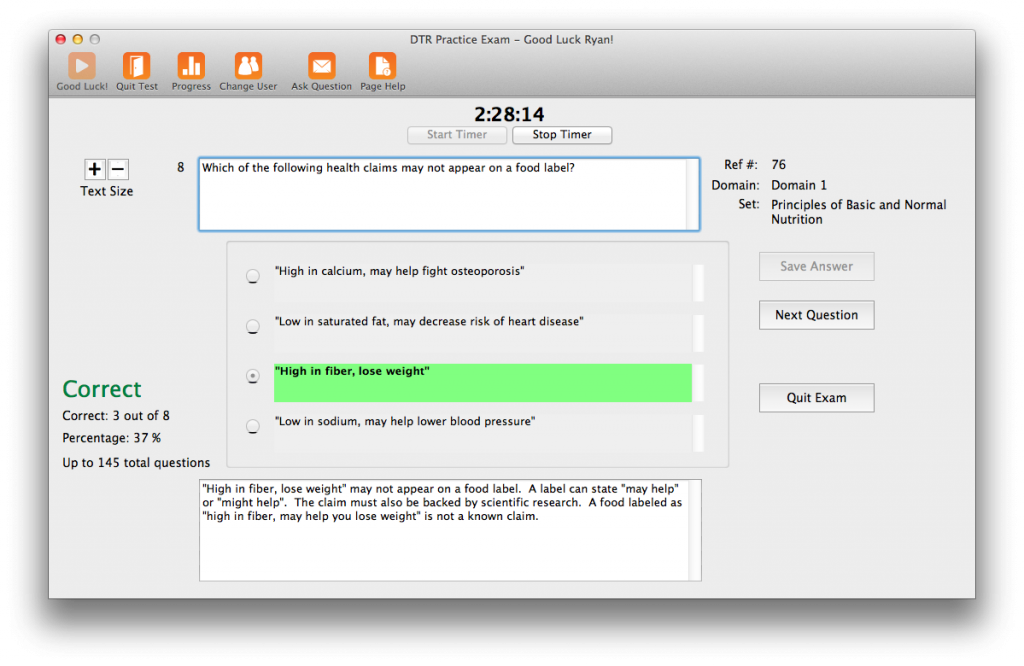I’m happy to announce that I passed my RD exam on Saturday! I can’t even explain how good it feels to be done. The test was surprisingly challenging, and I was disconcertingly nervous the entire time, but I passed with flying colors and now can officially call myself a Registered Dietitian. That feels great to say (type?) out loud!
One of the reasons I was nervous is because I didn’t study as much as many other students I know, and when reading online about the intense study sessions and long hours of reviewing that many students went through, I felt a bit underprepared going in to the test. I really struggled to stay focused during private study sessions, and felt highly unmotivated over the past few weeks as I mentally prepared to take the exam.
However, I’d say there were three significant reasons I passed the test, despite having studied less than a solid week and maybe spending 10-12 hours total reviewing the information.
#1 – UNC Chapel Hill prepared me REALLY well
My knowledge of biochemistry, public health, and clinical nutrition was strong, thanks to the first class education I received at UNC. As one of the top ranked nutrition programs in the country, they ensure that their students are very well prepared for not only the RD exam, but for whatever career path they choose to take.
While I personally prefer clinical nutrition, I know that if I wanted to do work in public health, that I’d be ready to handle it. And while my biochemistry knowledge has faded somewhat since I was in class, I do feel that I’m able to understand research and high-level nutrition science that comes from blogs like Chris Masterjohn’s and Paul Jaminet’s. So I definitely think my program prepared me quite well for the RD exam, despite the fact that many of these courses I took over a year ago.
#2 – I studied SMART, not HARD
Being totally honest, I found most of the study materials for the test to be quite boring. There are many topics that RDs have to be somewhat knowledgable about, including food service and management, and reading about those topics bores me practically to death. So it’s not that I didn’t plan to study hard and for many hours, but I found that I literally just couldn’t pay attention to the information anymore. I tend to struggle focusing on things I’m disinterested in (and get laser-focused on my passions), so studying for more than an hour at a time was nearly impossible.
However, for me, I find that “practice makes perfect”, and that taking multiple practice tests over the course of many days is the best way for me to prepare for any test. So I found that the Visual Veggies practice test software was extremely helpful for me in getting myself ready for the exam, for a few different reasons. One is that I got confident in my ability to answer many of the more challenging, math-focused problems by practicing the equations and learning which information was most pertinent. Two is that the practice questions explain the answers once you’ve submitted your answer to the program, so if you get it wrong, the program explains why the answer was what it was. This is a crucial component to any practice test, because if you don’t know why your answer is wrong, you’re not actually learning any reasoning skills. And having good reasoning skills is arguably the most important thing in passing the RD exam.
The third reason the program was helpful is that it shows you a bar graph of your various percentages for how you’re doing in the different domains. I took several practice tests and noticed I was doing less well on Domain 3 and 4, so the days before the test I decided to focus my efforts on studying those specific domains using the Jean Inman study guide. I managed to get my practice test scores on those domains up into the same general number range as Domain 1 and 2, so I felt more confident in the total breadth of my knowledge going into the test.
Would you like to save this post?
Your email address is 100% safe and will never be sent spam.
Even though the Visual Veggies program is a bit pricey, I strongly recommend investing in it. For me, I felt that if I could save many hours of studying by paying for a program, that it was worth the investment. And I definitely think it paid off.
Luckily for you, as one of my readers you can get 15% off the program by using the promo code ANCESTRALIZEME! (expires 12/31/14)
Another helpful study program was the Jean Inman study guide. I mostly used the audio and listened to it while doing chores or at the gym. I zoned out more than a few times (much of it is quite boring) but I do think that some of the soundbites stuck in my brain, so I may have remembered more facts about random food preparation techniques or food safety protocols than I would have had I not used the audio recordings. And her study guide includes hundreds of practice questions, so I used those to study some with a classmate/friend of mine. I mostly used the guide itself to review Domains 3 and 4, which were my weaker areas.
One last app I used was the Registered Dietitian Exam app on my phone’s app store. It’s available on both Android and iPhone, and I found that I could run through test questions sporadically throughout the day if I felt like studying for 10-20 minutes. Truthfully, I used the app several times to help me fall asleep. I told you… a lot of this information is really boring (to me at least) so I have a hard time paying attention to it for too long!
The best thing to do is to expose yourself to this information in small chunks over a long period of time. Don’t try to cram for the test in just a few days. While I may have only spent 12 or so total hours studying, I spaced those 12 hours out over at least 2 weeks. That made it not only more bearable, but likely more efficient for long-term memory storage. (And that’s actually a scientifically-supported studying strategy!)
#3 – I never stopped learning
I really believe that a huge reason I was able to get through my MPH/RD program at UNC in general was that I was constantly learning about nutrition, whether that be for my own personal interest or as a research and programming assistant for Chris Kresser. While much of the information was contradictory to information we learned in the RD program (e.g. the role of saturated fat and cholesterol in heart disease), or simply something not even discussed (e.g. the role of the microbiome in determining what kind of food you should eat), I did feel very well prepared for both my internships and the RD exam simply because I’ve been reading about nutrition nearly nonstop since I entered the program in 2011.
The more frequently you’re exposed to a topic, the better you’re able to master it. And like I said, the trick to the RD exam is not rote memorization but critical thinking and the ability to make informed decisions. So having used my brain to make informed decisions about nutrition recommendations for the past 3 years, I felt like taking the RD exam really emphasized that skill, as opposed to requiring a strong and concrete knowledge of facts.
Personally, I don’t think you have to study for weeks or months to pass the RD exam. Maybe I’m being flippant (and of course study as much as you deem necessary) but I personally don’t think it’s necessary to dedicate your life to studying for an exam that tests you on information you’ve been repeatedly exposed to for the past couple of years!
Just pay attention in school and your internship, continue reading about nutrition research on your own time, and use time-smart studying techniques so you’re not wasting hours and hours of your life studying for an exam that ultimately tests your ability to think critically. And try not to worry about it… positive thinking will get you far!
Remember, you can get 15% off Visual Veggies software with the promo code ANCESTRALIZEME until the end of 2014!
This post may contain affiliate links. If you click on a link and make a purchase, I may receive a small commission.


+ show Comments
- Hide Comments
add a comment